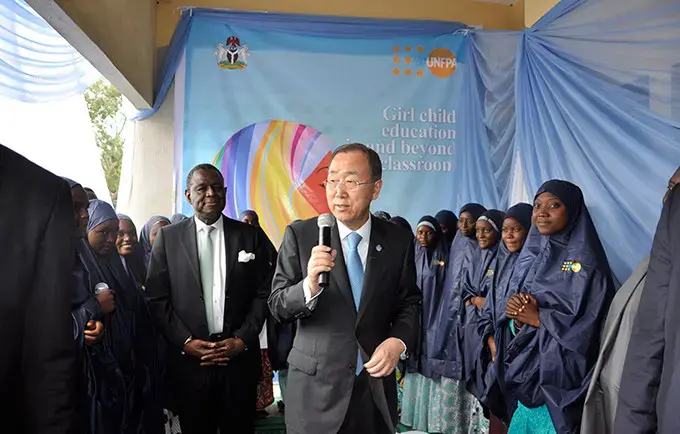Niamey, 29 October 2015. The launch of the "Sahel Women Empowerment and Demographic Dividend Project” will take place in Niamey Palais des Congres on 2 November 2015 under the high patronage of His Excellency the Prime Minister of Niger, Mr. Brigi Rafini.
The Sahel Women Empowerment and Demographic Dividend Project is a partnership between the United Nations and the World Bank Group to answer a call launched by the Presidents of Sahelian countries.
Developed thanks to a partnership with the West African Health Organization (WAHO), the Permanent Inter-State Committee to Fight against Drought in the Sahel (CILSS) and the Centre for Applied Research on Population and Development (CERPOD), it will be implemented with technical assistance from UNFPA, the United Nations Population Fund, and funding of 205 million USD from the World Bank over a 4-year period. The Project will be implemented cross six countries, Burkina Faso, Côte d'Ivoire, Mali, Mauritania, Niger and Chad.
In line with the recently adopted Sustainable Development Goals, the main objective is to empower its principal beneficiaries, women and girls, and enable them to take decisions that will contribute, in a sustainable way, to the development of their communities. The women’s empowerment project covers three components. The first component is about improving the demand for family planning and maternal and child health services by promoting social and behavioral change and empowering women and adolescents.
The second component aims at improving supply of contraceptives and life-saving maternal and child health commodities, and of health workers with midwifery skills in rural areas, and the third to strengthen analysis and use of demographic data into policy relevant briefs to inform, empower and hold national policy makers accountable for progress.
The Sahel region has a high incidence of poverty, food insecurity and by multiple constraints that have a negative impact on its security and development. The region faces various factors of fragility and instability, from conflict, drought and recurrent floods through vulnerability to global crises (e.g. the financial crisis, the crisis in food prices). About half of the population lives on less than $ 1.25 a day, with over 11 million people at risk of starvation and 5 million children under five with acute malnutrition. The sub-region is generally in the bottom rankings of the United Nations Development Program’s (UNDP) Human Development Index.
In recent years, economic growth was strong in the Sahelian countries, but did not cause an increase in the Gross Domestic Product (GDP) or greater gender equality. The slow demographic transition is a key underlying factor in the Sahel countries that have not managed to translate their strong GDP growth in greater prosperity and a better well-being of their population.
The demographic dividend is the inclusive accelerated economic growth that may result when a country’s working age population grows larger than the non-working dependents. Because of their current demographic profile, the countries are unable to take advantage of inclusive growth. However, through strategic policy action by today’s leaders the Sahel can capitalize on its rapidly growing working-age population, to seize the demographic dividend and propel its economic take-off.
And in order to meet the challenges related to the population structure in the Sahel, the Declaration called "Appeal of Niamey on demographic challenges in the Sahel" has been launched by the President of the Republic of Niger, His Excellency Mahamadou Issoufou, on 6 November 2013, during the visit to Niger of the Secretary-General of the UN Ban Ki-moon, the President of the World Bank Group, Mr. Jim Yong Kim , the Chairperson of the African Union Commission, Dr. Nkosazana Dlamini Zuma, and the Executive Director of UNFPA, Dr. Babatunde Osotimehin.
With this launch, the six participating governments will implement an ambitious program to reap the benefits of the demographic dividend in the Sahel.
For more information or to set up interviews with participants, please contact:
- Moussa Abdou Saley, Advocacy and Communication Officer: +227 92 19 83 50; saley@unfpa.org
- Souleymane Saddi Maâzou, Communications Officer: +227 92 19 83 56; saddi@unfpa.org
- Habibatou Gologo, Regional Media Specialist: + 221 77 740 09 56; gologo@unfpa.org
- Rachel Winter Jones, Communications Lead: +1 202 4584720/+ 1 202 446 8196; rjones1@worldbank.org





